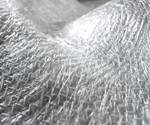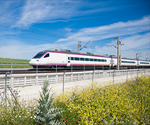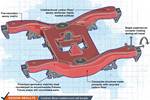AIMPLAS develops flame-resistant resins for railway lightweighting project
As part of the European MAT4RAIL project, AIMPLAS developed flame-resistant hybrid resin formulations for composite structural components.
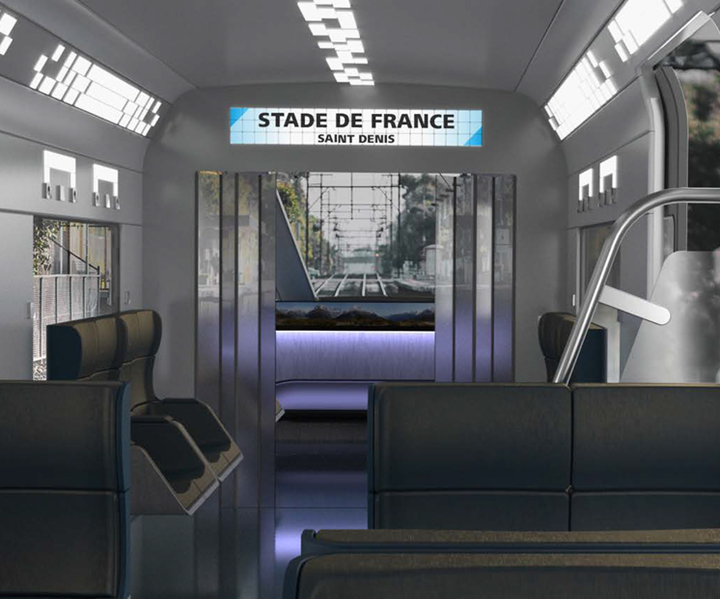
Source | AIMPLAS
The recently completed European MAT4RAIL project aimed to develop new materials and components for the “railway of the future,” and included efforts to reduce vehicle weight by replacing metal structural components with lightweight composites, as well as increasing vehicle capacity and passenger comfort through the use of smart modular design.
As part of this project, AIMPLAS (Valencia, Spain) reports that it has developed hybrid resin formulations with improved resistance to flame propagation to be applied to fiber-reinforced polymers, for use in structural components for railway vehicles. The company reports that results are promising and the new formulations are expected to be of use in other sectors such as construction, the automotive industry and aeronautics.
In addition, according to AIMPLAS, collaborative work was done to improve specific regulations on calculating fatigue requirements for trams, and involved efforts to standardize the design and calculation of trams by means of sensor monitoring, as well as evaluating and improving joins between metal and composite materials.
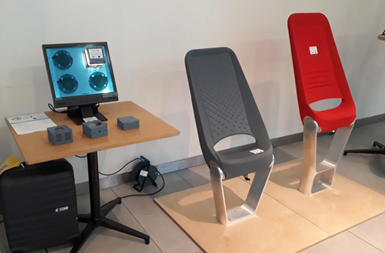
Source | AIMPLAS
The project also involved modifying the design of cabins and seats by incorporating new technologies and communication systems. The goal was to increase safety, detect the presence of extraneous objects on the tracks and improve vehicle intercommunication. Modular carriages were also developed to enable a range of configurations. A new seating design was developed to accommodate more passengers with greater comfort while offering more seating arrangement options.
Implementation of this project is expected to improve railway infrastructure in terms of costs, operations, reliability, punctuality, increased capacity and energy efficiency, and reduced life cycle costs.
The MAT4RAIL project began in 2017 and was coordinated by CIDETEC (San Sebastián, Spain). Collaborators in the project included AIMPLAS and fifteen other research centers, SMEs, companies and universities from seven European countries: Instituto Tecnológico de Aragón (Spain), the University of Bremen (Germany), IMA Material Research and Application Technology GmbH (Germany), NVGTR GBR (Germany), Grammar Railway Interior GmbH (Germany), Centre Scientifique and Technique de L’Industrie Textile Belge (Belgium), Coexpair SA (Belgium), Huntsman Advanced Materials GmbH (Switzerland), Escatec Switzerland AG (Switzerland), Accelopment AG (Switzerland), Rise Research Institutes of Sweden AB (Sweden), ASAS Aluminyum Sanayi Ve Ticaret Anonim Sirketi (Turkey), Spirit Design Innovation and Brand GmbH (Austria) and INDAT Modellbau Werkzeugbau Formenbau GmbH (Austria).
The MAT4RAIL project was funded by the Shift2Rail Joint Undertaking (S2R JU), a public-private partnership in the rail sector established under the European Union Research and Innovation program Horizon 2020, grant agreement number 777595.
Related Content
-
Co-molding SMC with braided glass fiber demonstrates truck bed potential
Prepreg co-molding compound by IDI Composites International and A&P Technology enables new geometries and levels of strength and resiliency for automotive, mobility.
-
ASCEND program update: Designing next-gen, high-rate auto and aerospace composites
GKN Aerospace, McLaren Automotive and U.K.-based partners share goals and progress aiming at high-rate, Industry 4.0-enabled, sustainable materials and processes.
-
Automotive chassis components lighten up with composites
Composite and hybrid components reduce mass, increase functionality on electric and conventional passenger vehicles.

.jpg;width=70;height=70;mode=crop)
